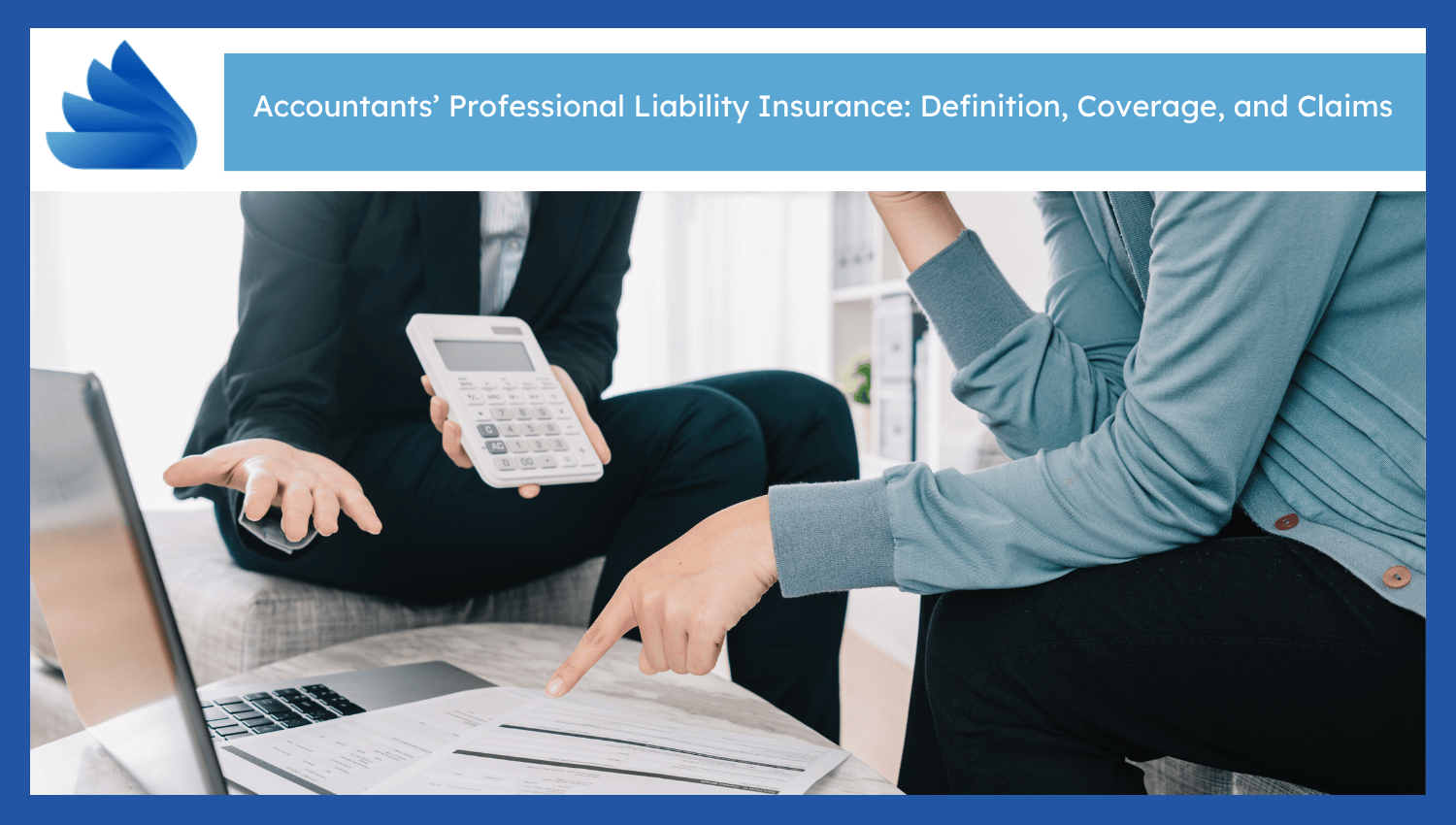
Accountants’ Professional Liability Insurance: Definition, Coverage, and Claims
Accountants' professional liability insurance is a custom coverage of Errors & Omissions (E & O) insurance specifically servicing accounting, tax, and financial professionals. It covers claims of professional mistakes, negligence, or wrong statements.
The Insurance Information Institute states that 40 percent of small businesses receive liability claims. Accounting firms have a fiduciary duty which makes them susceptible to civil liability claims when they make a wrong tax fill or poor financial advice.
The insurance is essential to credibility as a professional and is mandatory in many jurisdictions to remain regulatory compliant and be able to continue serving clients.
What Does an Accountant's Professional Liability Insurance Cover?
Here are six key protections included in Accountants' Professional Liability Insurance:- Mistakes in filing an income tax: Failures like late delivery or inaccurate submissions are likely to lead to fines or an audit. According to AICPA risk data, more than 22 percent of Errors & Omissions claims in the accounting field are tax-related.
- Improper financial guidance: The failure to advise the clients on budgeting, forecasting or investment that lacks any basis results in financial losses. Professional liability insurance protects against subsequent lawsuits and the coverage payment requests of clients.
- Audit mistakes: Failure to include red flags or documentations in the audit results in regulatory penalties. According to AICPA, such errors make a large number of claims in public accounting firms which are costly.
- Identification of fraud failure: Failure of detection of the fraudulent transactions during the review of financial transactions leads to client losses. In many cases, accountants face blame from the courts due to material omissions, particularly in the case of attestation services.
- Violation of fiduciary: Accountants are subject to a duty of care. Failure to act in the client's interest, mismanagement or conflict of interest constitutes a breach. This leads to major sources of ethics-based claims.
- Judgments, settlements, and Legal fees: Attorney fees, settlements and court awards are covered. In the E&O claims, the legal cost is usually greater than 35.000 dollars, regardless of whether or not any failure is found at the end of the claim.
What Is Not Covered by Accountants' Liability Insurance?
Here are six key protections that are not included in Accountants' Professional Liability Insurance:- Intentional fraud: There is no coverage regarding willful improper actions or criminal misconduct. Judicial decisions categorize intentional fraud as a deliberate case, and it negates professional liability coverage irrespective of the policy form or firm size.
- Breach of contract: Non-professional disputes, such as a breach in delivering work according to the contract terms, are not included. Breach of contract is addressed by general contract law instead of negligence or professional error statutes.
- Employee disputes: Accountants' Professional Liability Insurance does not cover workplace harassment claims or discrimination. Such cases need Employment Practices Liability Insurance (EPLI) that specifically deals with internal employee allegations and defense against compliance lawsuits.
- Cyberattacks: Errors & Omissions insurance does not cover data breaches and ransom. Cyber liability insurance is protection against threats that are electronic, and is meant to cover loss of data and system failure, and the notification expense.
- Physical injuries: Slips or equipment accidents that happen in offices are not covered under E&O. Such occurrences fall under the general liability assurance that covers third-party bodily harm or damage to property.
- Known claims or prior acts: Claims that are linked with known problems guarded during underwriting are excluded. The insurers only protect unknown risks and reporting previous risk breaches voids the conditions of the policy and the coverage becomes invalid.
Who Needs Accountants' Professional Liability Insurance?
Here are five groups that need Accountants Professional Liability Insurance:- Certified Public Accountants (CPA): CPAs experience significant risk due to tax filing errors, misstatements in the audit, and fiduciary breaches. According to AICPA reports, more than 60 percent of professional liability claims involve CPAs in complex regulatory work.
- Tax Preparers: Tax preparations involve sensitive and deadline-sensitive tasks. Misfiling or failure to claim credits normally causes loss to clients. More claims are filed during tax season and most prominently by independent preparers and seasonal professionals.
- Bookkeepers: Bookkeepers are responsible for recording errors and classification errors. Errors in reporting or inability to indicate inconsistencies result in inaccurate financial statements, resulting in financial penalties or customer litigation.
- Accounting Firms: Companies are vicariously liable for employee and partner acts. Group-wide coverages guard against intra-firm errors, accounting problems, and enterprise legal liability during contracts or customer relationships.
- Financial Consultants: Investment or compliance advisors are exposed to risks due to inappropriate recommendations. Regulatory guidance associated with tax shelters or cross-border planning has greater litigation and enforcement penalties.
What Are the Types of Accountants' Liability Policies?
Here are the six major types of Accountants' Professional Liability Insurance:- Claims-Made Policy: Covers claims made and reported while the policy is active. Most professional liability policies use this structure. Coverage starts from the retroactive date listed in the policy, not the date of the incident.
- Occurrence-Based Policy: Covers incidents that occurred during the policy term, even if reported later. This structure is less common in professional liability insurance due to higher risk exposure and uncertain future reporting timelines.
- Tail Coverage: Allows claims reporting after a policy ends, but only for incidents during active coverage. Often used when a professional retires, closes a firm, or changes providers without a gap.
- Prior Acts Coverage: Extends protection to services performed before the policy's beginning date. Coverage begins from a specified retroactive date if no gaps exist in prior insurance. Common when switching insurers.
- Group Coverage for Firms: Provides shared protection to partners, employees, and subcontracted staff. Ensures that all work done under the firm’s name is included in one unified professional liability policy.
- Protection Under Firm-Wide Policy: Covers firm-wide legal exposures, including individual mistakes. The firm prevents gaps caused by separate policies and ensures joint legal defense and consistent claim handling across all levels.
How to Choose the Right Liability Policy for Accountants
Here are six main factors to keep in mind when selecting a legal malpractice policy.- Risk Exposure: The policy to be selected is based on the type of risk. Practices involving high tax volume are often subject to high-volume, low-cost claims, whereas those involving high audit are liable. Trends in claim reporting provided by AICPA reflect that in most cases claim size grows with the scope of audit and regulatory attention.
- Coverage Limits: The typical limits are $1 million per claim / $2 million aggregate limits. The larger firms, which are engaged to work on bigger audits or advisory work tend to increase the limits to absorb the increasing settlement expenses and challenging client needs.
- Costs for Defense: Policies disagree on whether defense costs are covered within the insurable limits or without. Outside-limit structures maintain all claim value on settlements, particularly where there are lengthy legal actions or large numbers of defendants.
- Optional Coverages: Other policies that are optional include cyber liability, fidelity bonds, and EPLI to cover the emerging threats. These are commonly packaged together in accounting firms that have digital systems, payroll services, or develop them internally to offer end-to-end protection.
- A-Rated Insurance Provider: An A-rated insurance company experienced in financial professions provides reliable underwriting and claims management, as well as offering policy specifications in the sector. Bigger carriers usually provide specialized coverages to audit-intensive or revenue-oriented companies.
- Assure Compliance: State boards, AICPA guidance, and contracts between the client and firm have to provide the regulations that policies conform to. The failure to comply leads to licensing problems, refusal by the law, or cancellation of the engagements caused by the inadequate coverage provisions.


